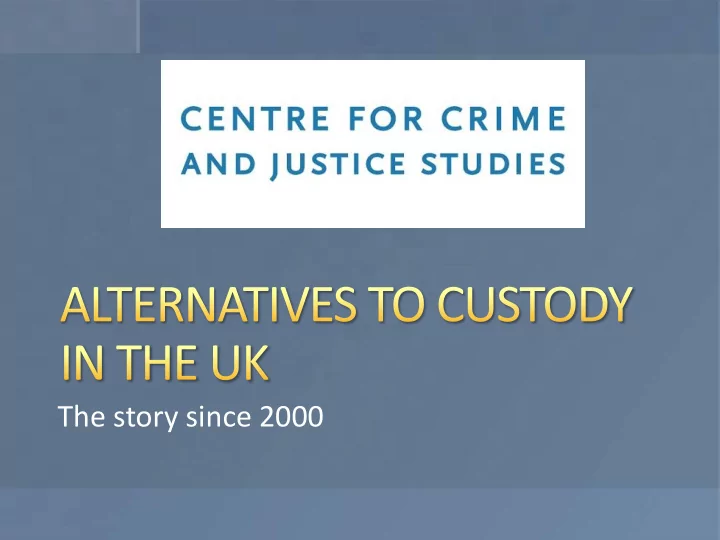

The story since 2000
Towards more effective, fairer use of alternatives to prison July 2014 – June 2016 Participating countries Italy France Portugal Spain Latvia Poland Greece UK
Despite record prison numbers evidence that reconviction rates are higher for ex-prisoners there has been no overall decarceration strategy in the UK in the last 15 years. Instead there have been attempts to control growth in prisoner numbers. Largely via changes to community sentencing and early release rules.
Statutory presumption against short sentences, enacted in 2010 Anyone who would previously have received a short prison sentence is now more likely to get a community sentence. Sentencing figures suggest this has reduced the proportion of short sentences passed. Northern Ireland looked at a similar law, but not passed.
2002 2013 E&W 71,218 83,842 NI 1,026 1,826 S 6,182 8,178 UK total 78,426 93,846
The Westminster rhetoric champions ever tougher sentencing. ‘ Swift and sure ’ justice. In 2014 Chris Grayling welcomed increase in average prison sentences since 2010. Boasted of measures to toughen sentencing. Linked these to continued falls in crime rates. For at least a decade governments have tried to try to contain growth in prison numbers without sounding ‘soft on crime’. As part of this:
The main approach of previous governments has been to change community sentences . Laws and briefings to make them more ‘tough’ and ‘effective’ – and be seen as acceptable instead of prison In policy terms, the emphasis since 2000 has been on ‘reducing reoffending’ (mainly by looking for alternatives to short-term prison sentences). NOT cutting prisoner numbers.
Community sentences rose dramatically in the UK (especially in E&W) in the early 2000s, peaking in 2007, then falling again. The most common sanctions: fines, suspended sentence orders and community orders. For SSOs and COs, punitive ‘requirements’ most often added are unpaid work and probation. Increasingly, with electronic monitoring.
2005 2013 SSOs 5,383 38,227 COs 46,846 73,567 The expansion in community sanctions has not had the effect on prisoner numbers many had hoped for.
One cause of higher prisoner numbers is the increased use of custody for breach of community sentences, even non-payment of fines, and of release conditions. Piling on requirements sets people up to fail. Need to be sceptical about the benefits of alternatives to custody and look at their adverse effects.
In the US today, about half of all prisoners are there for breach of probation or licence conditions. Need to address the over-use and over- punitiveness of alternatives to custody, if we want to avoid this happening here.
• Probation requirement has increased greatly since 2000. Imposed more frequently as a requirement of SSOs and COs; as a condition of licence on release from prison.
As a sentence requirement 2005 2013 34,741 57,856 As a condition of release 2002 2014 22,000 39,270
Compulsory supervision for all offenders sentenced to 12 months or less in prison under ‘Transforming Rehabilitation ’ Will increase numbers under probation even further
Ours are about accountability and transparency conflicts of interest resourcing (public sector cuts – private sector cost pressures) standards and quality (staff numbers, training, workloads)
40 16,000 35 14,000 12,000 30 25 10,000 20 8,000 6,000 15 Frontline staff Caseload 10 4,000 5 2,000 0 0 2000 2001 2002 2003 2004 2005 2006 2007 2008 2009 2010 2011 2012 2013 2014
UK national report, with statistics on prison and alternatives since 2000, releasing in July Consolidated report, online by September 2 national workshops to identify good practice, necessary reforms UK forum, November/December 2015. European handbook of best practice on alternatives to custody: CCJS to publish in Feb 2016. National and European campaigns up to July 2016.
Recommend
More recommend